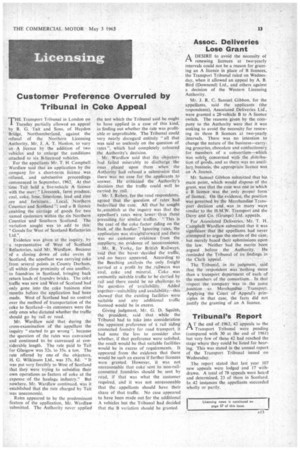Customer Preference Overruled by Tribunal in Coke Appeal
Page 15

If you've noticed an error in this article please click here to report it so we can fix it.
THE Transport Tribunal in London on Tuesday partially allowed an appeal by R. G. Tait and Sons. of Haydon Bridge, Northumberland, against the refusal of the Northern Licensing Authority, Mr. J. A. T. Hanlon, to vary an A licence by the addition of two vehicles and to enlarge the conditions attached to six B-licensed vehicles.
For the appellants Mr. T. H. Campbell Wardlaw said that an application by the company for a short-term licence was refused, and substantive proceedings commenced in September. 1962. At that time Tait held a five-vehicle A licence with the user: ", Livestock, farm produce, coal, coke, lime, limestone, lead and zinc ore and furniture.. Local, Northern Counties and Scotland and a B licence enabling the carriage of goods for two named customers within the six Northern Counties and Southern Scotland. The variation sought was to add to this: "Goods-for West of Scotland Refactories Ltd.".
Evidence was given at the inquiry, by a representative of West of Scotland Refactories, said Mr. Wardlaw. Because • of a closing down of coke ovens ip • Scotland, the appellant was carrying Coke from several points in County Durham, all within close proximity of one another, to foundries in Scotland. bringing back return loads of foundry bricks. The coke traffic was new and West of Scotland had only gone into the coke business nine months before the application had been made. West of Scotland had no control over the method of transportation of the coke to Scotland—its customers were the only ones who dictated whether the traffic should go by rail or road.
Mr. Wardlaw said that during the cross-examination of the appellant the inquiry " started to go wrong ", because the question of the rates was canvassed and continued to be canvassed at considerable length. The rate paid to Tait for Glasgow was 32s. to 35s. a ton. The rate offered by one of the objectors, H. G. Wilkinson Ltd., was 37s. 8d. "It was put very forcibly to West of Scotland that they were trying to subsidize their own operations as factors of coke at the expense of the haulage industry." But nowhere, Mr. Wardlaw continued. was it established that the rate charged by Tait was uneconomic.
Rates appeared to be the predominant feature of the application. Mr. Wardlaw submitted. The Authority never applied the test which the Tribunal said he ought to have applied in a case of this kind, in finding out whether the rate was profitable or unprofitable. The Tribunal could very nearly disregard entirely "all that was said so uselessly on the question of rates", which had completely coloured The Authority's decision. '
Mr. Wardlaw said that the objectors had failed miserably to discharge the onus placed upon them when the Authority had refused a submission that there was no case for the applicants to answer. He criticized the Authority's decision that the traffic could well be carried by rail.
Robey, for the road respondents, agreed that the question of rates had bedevilled the case. All that he sought to,establish at the inquiry was that the appellant's rates were lower, than those prevailing for similar traffics. "This is the case of the coke factor riding on the back of the haulier.'" ignoring rates, the application was straightforward and there was no customer evidence from the suppliers; no evidence of inconvenience.
Mr. R. Yorke, for British Railways, said that the buyer decided the traffic, and no buyer appeared. According to the Beeehing analysis the only freight carried at a profit by the railways was coal, coke and mineral. Coke was eminently suitable traffic to be carried by rail and there could be no challenge to the question of 'availability.' Added together—suitability and availability—this showed' that the existing facilities were suitable and any additional traffic licensed would he in excess.
Giving judgment, Mr. G. D. Squibb, the president, said that while the Tribunal had to take into consideration the apparent preference of a rail siding connected foundry for road transport. it had none the less to consider also whether, if that preference were satisfied, the result would be that suitable facilities would be in excess of requirements. It appeared from the evidence that there would be such an excess if further licences were granted. However, it was not unreasonable that coke sent to non-railconnected foundries should be sent by road, if that was what the customer required, and it was not unreasonable that the appellants should have their share of that traffic. No case appeared to have been made out for the additional A vehicles but the Tribunal had decided that the B variation should be granted.




















































































































































































































































